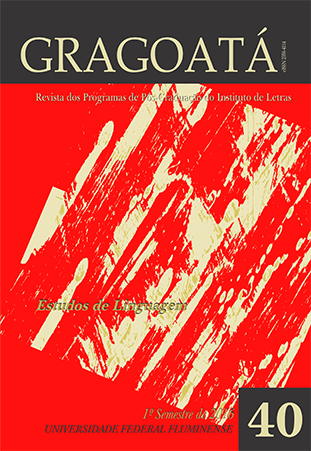‘CRY ME A RIVER’: METAPHORIC HYPERBOLES IN THE INTERFACE BETWEEN DISCOURSE AND COGNITION
DOI:
https://doi.org/10.22409/gragoata.v21i40.33380Palabras clave:
hyperbole, metaphor, cognitionResumen
This paper aims at analyzing metaphor as a frequent semantic realization of “the language of excess” (WEBB, 1993), i.e., hyperbole. The hypothesis to be explored is twofold: firstly, from a discursive perspective, hyperbole aims at transcending a language repertoire available for expressing intensity and gradability, and as a corollary of that, subjectivity and evaluation. In this respect, metaphor, both conventional and novel, realizes, linguistically, this intensity with both discursive and cognitive effects, by drawing elements of the source domain which serve this dual purpose. The second hypothesis to guide our research refers to the conceptual nature of the vehicle term, in other words, the metaphoric hyperbole used. Our suggestion is that, within a conceptual scale involving elements of a particular frame, the one which is selected is the prototype of that category, which is used metaphorically with hyperbolic effects. The theoretical framework underlying the research involves the concepts of hyperbole, as defined by Claridge (2011), graduation (MARTIN; WHITE, 2005), conceptual metaphor (LAKOFF; JONHSON, 1980) and prototype (ROSCH, 1979, 1983). A brief analysis of the conventional hyperbolic expression cry me a river, with examples drawn form a general corpus, will illustrate the discussion presented in the paper.
Descargas
##submission.downloads##
Publicado
Cómo citar
Número
Sección
Licencia
AUTORIZAÇÃO
Autores que publicam em Gragoatá concordam com os seguintes termos:
Os autores mantêm os direitos e cedem à revista o direito à primeira publicação, simultaneamente submetido a uma licença Creative Commons Atribuição 4.0 Internacional (CC BY 4.0), que permite o compartilhamento por terceiros com a devida menção ao autor e à primeira publicação pela Gragoatá.
Os autores podem entrar em acordos contratuais adicionais e separados para a distribuição não exclusiva da versão publicada da obra (por exemplo, postá-la em um repositório institucional ou publicá-la em um livro), com o reconhecimento de sua publicação inicial na Gragoatá.
A Gragoatá utiliza uma Licença Creative Commons - Atribuição CC BY 4.0 Internacional.











